We've independently reviewed this article to make sure it's as accurate as we can make it.
To find out more about our article creation and review process, check out our editorial guidelines.
Is your washing machine taking longer than usual?
That sucks! Waiting for your laundry to be done, only to find that your washer seems to be stuck in an endless cycle can be quite frustrating.
Don’t worry, though. I’m here to help.
The wash cycles can take longer than expected due to different factors, such as overloading the machine, selecting the wrong cycle, or excessive suds. An unbalanced load and water flow issues can also explain the problem.
Read on to learn how to keep your washing machine from taking too long!
Wash Cycle Taking Too Long? 5 Reasons Why
In this section, I’ll guide you through the different reasons that can explain why your washing machine cycles are taking longer than expected and provide various solutions.
Before delving into the troubleshooting section, please keep in mind that modern washing machines are equipped with advanced sensors and technologies designed to improve cleaning performance, which can result in longer cycle times compared to older models.
To determine whether your washer is operating normally or if there’s indeed an issue, it’s important to consult the manufacturer’s manual for specific information on cycle durations.
If you notice that your washer is taking longer than it should, please keep reading!
#1 Overloaded Washing Machine
When fixing a washing machine that takes longer than expected to complete a cycle, I always start by checking the size of the load.
Overloading your washer can affect water levels, strain the motor, and prevent even detergent distribution. As a result, the machine can add other cycles to improve the cleaning performance.
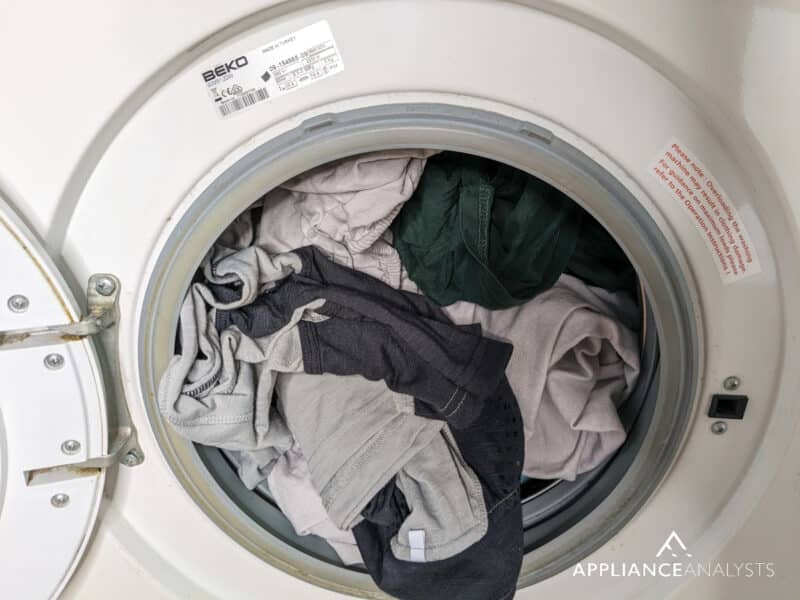
Aim to fill your washing machine to about 75% of its capacity to keep the wash cycles from taking longer than expected. Your clothes should be able to move freely.
If you have a large amount of laundry, it’s better to divide it into smaller loads rather than one large load.
#2 You’ve Selected the Wrong Cycle
The wash time will vary depending on the cycle selected on your washing machine.
All wash cycles are designed for different types of laundry and cleaning needs. Therefore, some cycles will take longer due to the additional steps involved in ensuring thorough cleaning and care for your clothes.
For example, a quick wash usually lasts around 30 minutes, whereas a normal wash can range from 45 to 60 minutes. On the other hand, a heavy-duty wash can take anywhere from 1 to 2 hours.
To ensure you’ve selected the right cycle, I recommend sorting your laundry and reading the care labels on your clothing. It’s also important to consider the level of soil.
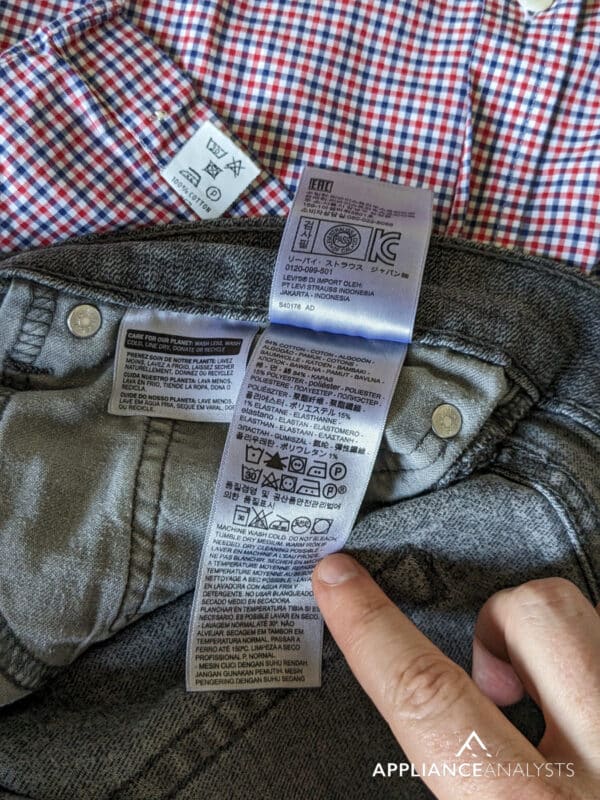
Once you’ve determined the right cycle for your laundry, check the manufacturer’s manual to see how long it’s supposed to take.
If the wash cycle takes much longer than the manufacturer stated, please keep reading.
#3 Excessive Suds
If your washing machine takes longer than usual to complete the cycle, you’re probably dealing with excessive suds.
You see, when there are too many suds, your washer will either stop the cycle to allow the suds to naturally dissipate or extend the rinse cycle to get rid of all the detergent residue.
To prevent excessive suds from extending the wash cycle, double-check you’re using the right type of detergent. If you have a High-Efficiency washing machine, you’ll need to use compatible products, as these washers use less water. HE detergents produce fewer suds and work more effectively in HE washers.
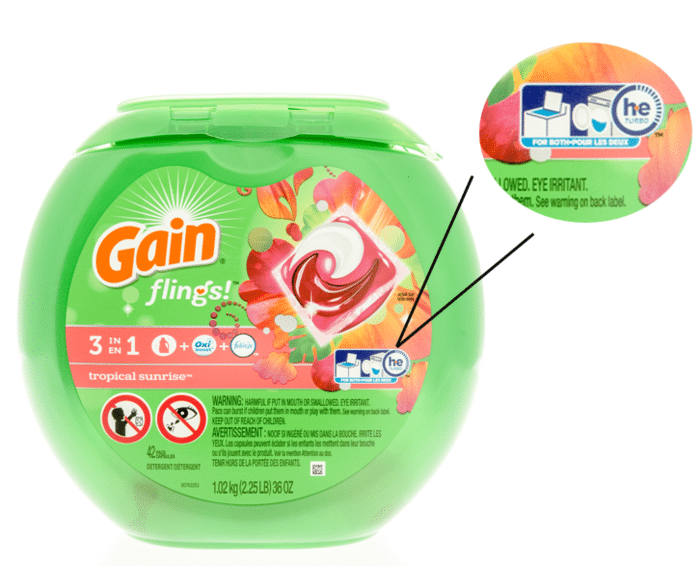
It’s also crucial to use the right amount of detergent. While using too much detergent can make you think your clothes will get extra clean, it’s actually quite the opposite. Read the manufacturer’s manual and product labels to determine how much detergent you should use.
Don’t forget to use a measuring cup and consider the water hardness in your area. Hard water requires using a bit more detergent.
#4 Unbalanced Load
In my experience, an unbalanced load can also cause the wash cycles to take longer than expected.
It’s important to ensure your clothes’ weight is evenly distributed around the drum. Otherwise, the machine will try to balance itself repeatedly and add time to the cycle.
Ensure that the bulky items, such as towels or blankets, are evenly distributed rather than concentrated on one side. Consider mixing items of similar weight or increasing the load size if your washer is running with too few items.
If you have a top loader and are still struggling with off-balance issues, push down on the empty tub. It should return to its original position without bouncing excessively. If you notice the tub bounces too much, the suspension rods are probably worn out and need to be replaced.
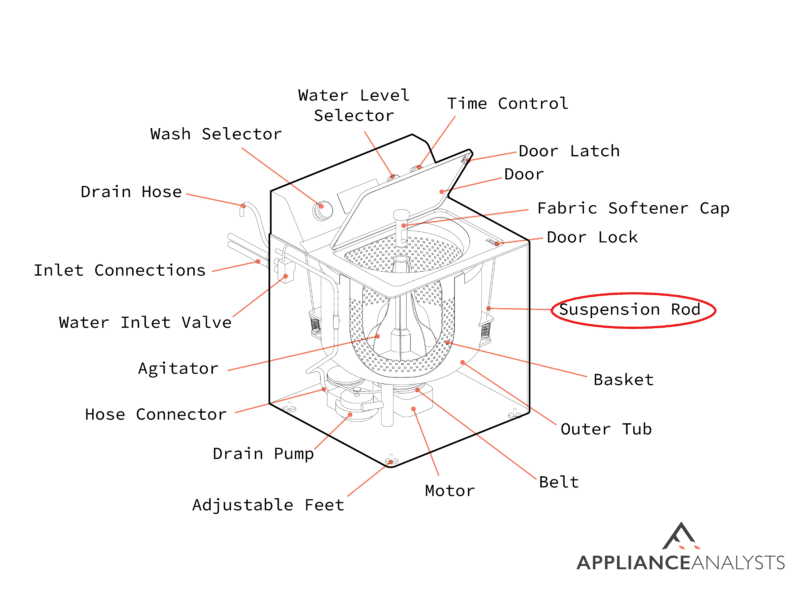
From what I’ve seen, a kit of four suspension rods typically costs between $20 and $60 for domestic brands like Whirlpool and Maytag. For foreign brands like Samsung, suspension rods usually come individually and cost $10 to $35 each.
#5 Water Flow Issues
If you’ve tried all the fixes above, but the wash cycle is still taking longer than expected, you’ll need to check the water flow.
The cycle time will increase if water enters your washer slowly because the machine needs to wait for the water to reach an adequate level before proceeding to the next stage of the cycle.
Different factors can contribute to water flow issues, which is why it’s important to inspect the following components:
- Check your home’s water supply: Turn off the water supply valves and disconnect the hoses from the back of your washing machine. Then, point each hose into a drain or the tub and turn the water supply back on to check if you have a good, fast flow. If the water flow is pretty slow, I find it best to contact a plumber.
- Check the hot and cold water supply: Select a cycle that only uses cold water, such as “Delicates”, and monitor how your washer fills. Then, select a cycle that uses hot water, like “Sanitize” or “Tub Clean”, and check the water flow. If the hot water flows much faster than the other (or vice-versa), ensure the hose is not kinked or damaged and check the filter.
- Check the filters: Turn off the water supply again and disconnect the hoses. Look for a plastic or metal mesh filter where the hoses connect to the washer, and remove it with a pair of needle-nose pliers. Then, clean the filter with warm, soapy water and reattach the hoses.
- Replace the water valve: If cleaning the filters and ensuring the hoses are not damaged doesn’t solve the issue, you’ll probably need to replace the water valve, which is responsible for controlling the water flow. Replacing the water valve can cost $30 to $120, and hiring a technician to install it could range from $150 to $320, depending on your location. But if you’re comfortable with home repairs, you could attempt to replace the water valve yourself.
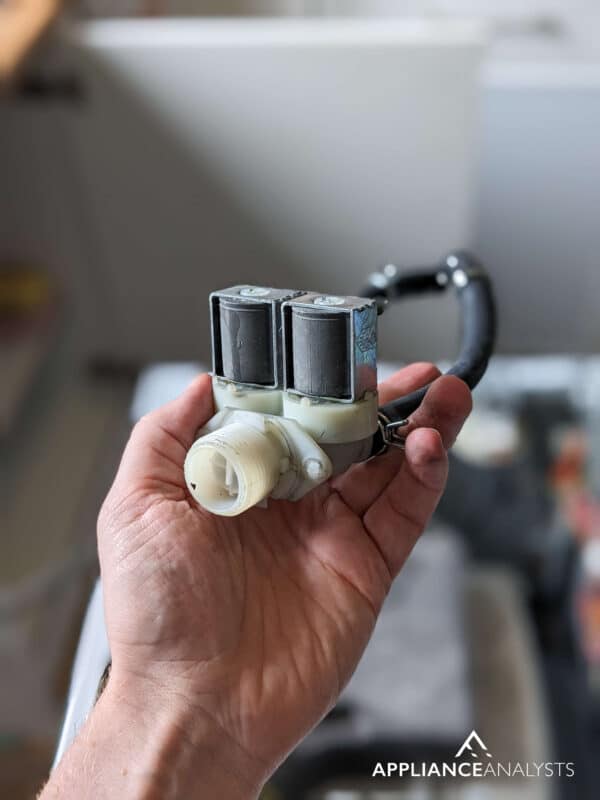
Wrapping Up: Quick Fixes for Extended Wash Cycles
Hopefully, now you know why the wash cycle is taking longer than expected.
Remember that if your washing machine takes too long to complete a cycle, you’ll need to make sure you’re not overloading the unit and evenly distribute the clothes around the drum. Don’t forget that each cycle has a different duration, so please refer to the manufacturer’s manual to see how long the selected cycle should take.
Additionally, avoid using too much detergent, inspect the suspension rods, and check for water flow issues. You should also ensure the hoses are not damaged, clean the filters, or replace the water valve if necessary.
Thank you so much for taking the time to read this article. If you ever experience a different issue while using your washer, please check out our site. You’ll find different ways to get your appliance working again in no time.
Good luck!










